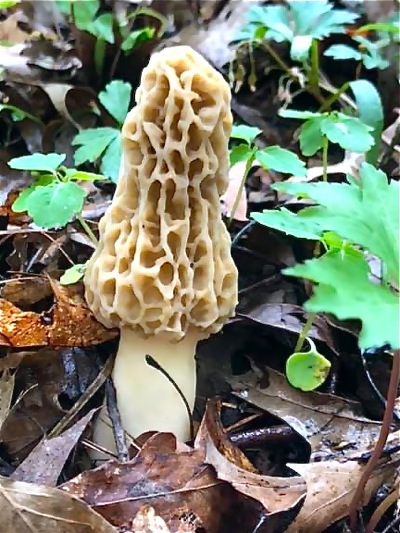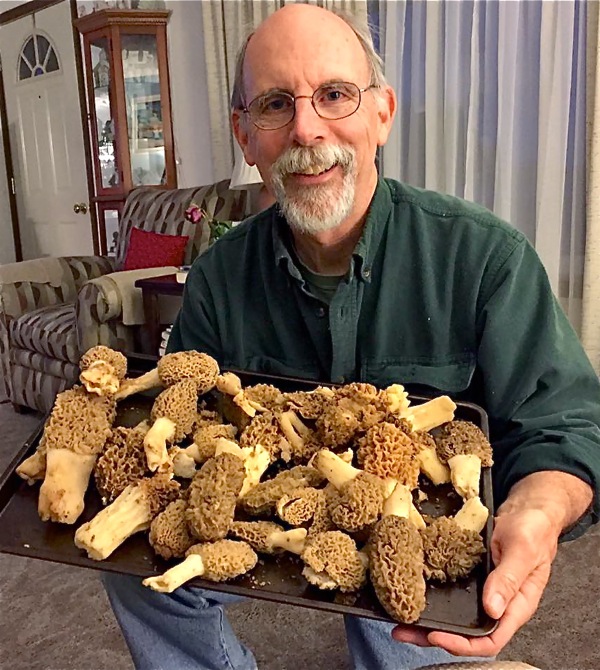If you don’t hunt turkeys in the spring, you might get your outdoors fix by hunting a different, and just as popular species. Join the ever-growing community of mushroom hunters…for the mighty Morel!
By Jim Abrams for Press Pros
 Briar was due for some professional grooming and I’d just dropped her off for her spring shave and trim. That little English cocker will hate me for a while but at least we’ll have fewer de-burring wrestling matches.
Briar was due for some professional grooming and I’d just dropped her off for her spring shave and trim. That little English cocker will hate me for a while but at least we’ll have fewer de-burring wrestling matches.
I was returning home after the early morning dog-delivery when I came across a neighbor getting ready for some work. Bob Yoder, president of the Mount Blanchard Gun Club and owner of some nearby property he manages for wildlife, was about to head into the field. Prepared to cut some encroaching vines and repair a tile, he took a short break to trade a few stories.
“It’s almost time,” Bob said with a smile as one hand stroked his ZZ-Top styled beard, though the rock-band’s whiskers may feature a little less gray.
“Won’t be long before turkey season,” I agreed. The season is due to open on April 24th in the south zone of the state while here in the north zone the opener will be May 1.
 “I don’t hunt turkeys,” Bob answered in his direct manner. “I rather hunt mushrooms. Warm weather and a little rain and we’ll be finding them. I’ve got a mess of squirrels in the freezer and nothing’s better. Me and my wife were sitting eating dinner one evening and there was squirrel, morel mushrooms, rice and other fixin’s. My wife said she wondered what the poor people were eating that night.”
“I don’t hunt turkeys,” Bob answered in his direct manner. “I rather hunt mushrooms. Warm weather and a little rain and we’ll be finding them. I’ve got a mess of squirrels in the freezer and nothing’s better. Me and my wife were sitting eating dinner one evening and there was squirrel, morel mushrooms, rice and other fixin’s. My wife said she wondered what the poor people were eating that night.”
That made me smile, mustering memories of my dad’s stories of growing up and the trips my brother and I made with him to look for the very spring mushrooms that Bob described. It seems like forever since those wandering walks – and like yesterday.
My dad usually timed his most ardent ‘shroom’ hunting to coincide with the redbud trees blooming, especially if there had been a soaking rain or two followed by some warmer spring days. He always carried a cane or walking stick which he used to flip over mushroom-camouflaging leaves near old logs and stumps.
Using that staff wasn’t just an effort to avoid too much unnecessary bending but rather to dodge sun-basking snakes. We lived in an area where copperheads weren’t uncommon and it was better to give them their distance than to reach down and scratch their backs.
I also knew exactly what was in his pockets; a bone-handled pocketknife, a curved briar pipe, pouch of cherry-blend tobacco, a plug of Redman in his hip-pocket and an empty plastic bread bag for the mushrooms. There would also be a few dollars to fund the expected “wild party” before returning home; an unharnessed revelry consisting of
Orange Crush and Wise potato chips. We lived life on the edge!
 Morchella, the true morels, are an edible mushroom with a distinctive honeycomb-like appearance. Their cap is composed of a network of ridges and valleys which give it a spongey look. In Ohio, they begin to appear in late March and will last through May. They’re often associated with turkey season since many hunters split their day between waiting in ambush for a careless Tom and sneaking up on hiding mushrooms to garnish their dinner.
Morchella, the true morels, are an edible mushroom with a distinctive honeycomb-like appearance. Their cap is composed of a network of ridges and valleys which give it a spongey look. In Ohio, they begin to appear in late March and will last through May. They’re often associated with turkey season since many hunters split their day between waiting in ambush for a careless Tom and sneaking up on hiding mushrooms to garnish their dinner.
Most shroomers – the self-proclaimed name of mushroom enthusiasts – have discovered that morels prefers to grow in shaded, wooded areas and their edges. They seem especially prone to be found around dead elm trees and in areas where tulip, aspen and oak trees grow.
Other plants that hint at productive hunting areas include Mayflowers, trillium, ferns, toadshade and moss. All prefer the same rich growing conditions of the morel and will often do their best to hide the fungus from discovery. One sweet-spot we often visited was an overgrown orchard and; if properly timed, was seldom without reward.
Early in the spring as the ground is warming, look for them on south-facing slopes in fairly open areas. As the season deepens, your search should also deepen into the woods and onto north-facing slopes. The best time is usually when daytime temperatures hold steadily in the 60’s with nighttime lows not dipping below 40-degrees.
Morel hunting is kind of like fishing. It may take you a while to find your first one but when you do, it’s time to slow down and start working a pattern. Morels like the company of their own kind and are often found in groups which my father called a “mess”. It’s also worth returning to likely areas every few days; timing is everything. It’s common for shroomers to hit their favorite spots year after year, but you’re going to need to find your own hotspots. Dedicated hunters aren’t likely to share any information except their recipes.
My dad instilled in me that slow, watchful patient pace he used in those spring woodlots. Sometimes we found a few, other times a mess and often we returned with an empty sack. We never came home without dirty pants, a few scratches and new stories. My father knew what wasting time was and; even coming home empty-bagged, this time was anything but wasted.
What do I carry when I’m looking for mushrooms?
Sometimes I’ll take along binoculars or a camera, a bird or flower identification guide or maybe a leash. One thing is sure, I’ll be carrying an empty plastic bread bag and the memories of two boys following their dad and another little English cocker named Cricket.
Check these sites for mushrooming insight: www.morels.com, www.thegreatmorel.com and www.mushroomgear.com. Facebook even has a page dedicated to hunting Ohio morels.
“Of all the paths you take in life, make sure a few of them are dirt.” – John Muir
Abrams is a retired wildlife officer supervisor for the state Division of Wildlife in Findlay. He can be reached at P.O. Box 413, Mount Blanchard, OH 45867-0413 or via e-mail at jimsfieldnotes@aol.com.

Coverage of the outdoors on Press Pros is proudly sponsored by Olde English Outfitters, in Tipp City.

Some hunt, others fish, but no one finds more satisfaction than those who bag a limit of 'shrooms. (Press Pros Feature Photo Provided)
